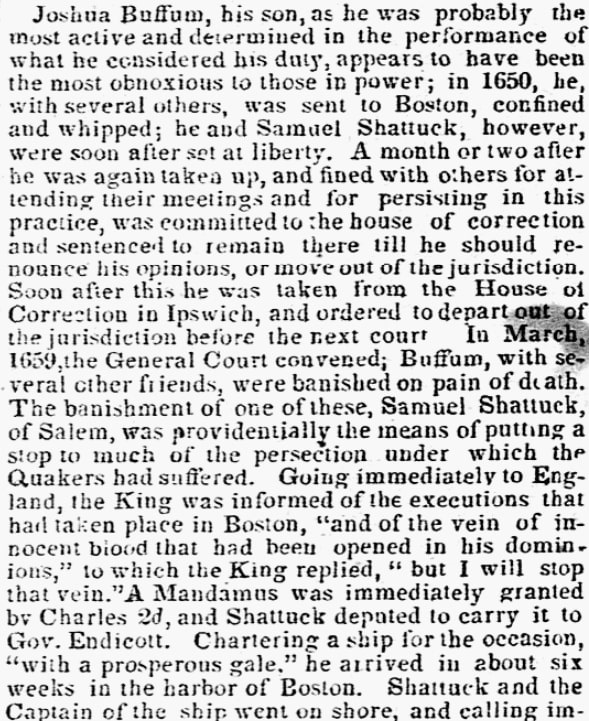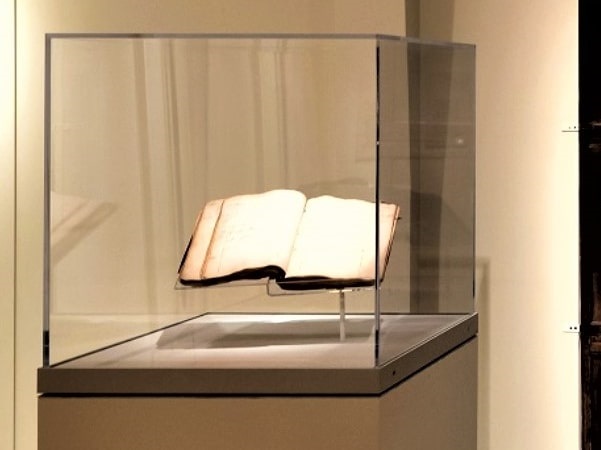Introduction: In this article, Melissa Davenport Berry writes about Quaker Joshua Buffum’s account book (1672-1705), which gives insight into life during the 17th century Massachusetts Bay Colony. Melissa is a genealogist who has a blog, AnceStory Archives, and a Facebook group, New England Family Genealogy and History.
Joshua Buffum of Salem, Massachusetts, was among the spirited Friends who stood up against the Puritan authorities during the 17th century Quaker persecutions. He was banished from the Massachusetts Bay Colony at one point for his beliefs. However, Buffum – like others – integrated back into the Puritan fold and established himself while remaining true to his faith. His account records, still preserved, reveal an impressive innovator and member of his community.
A New-Bedford Mercury article provided some details about Buffum’s early years and asserted that, out of all the Buffum Quaker clan, Joshua was the “most obnoxious” to the authorities. He was fined, whipped, and imprisoned for absenting himself from Puritan meetings, choosing instead to attend Quaker meetings.

As this article reported, Joshua refused to renounce his Quaker beliefs and practices, and so:
“In March, 1659, the General Court convened; Buffum, with several other friends, were banished on pain of death.”
One of those banished, Samuel Shattuck, went to England to tell the king about the Quaker persecutions. The newly restored king, Charles II, issued an order in 1661 forbidding the Massachusetts Bay Colony from executing anyone for their Quaker beliefs.
Joshua Buffum returned to Salem and took up his work, staying true to his faith. As the article reported:
“Although he was afterwards fined for absenting himself from church, and put in the stocks for affronting the Court, he seems generally to have enjoyed his opinion [i.e., Quaker belief] without interruption.”
Buffum forged partnerships and business ventures with some of the leading citizens in the Puritan community. He was a carpenter, wheelwright, miller, cabinetmaker, and machinist. His account book (1672-1705) is housed at the Phillips Library, Peabody Essex Museum (PEM), in Rowley, Massachusetts.
Henry Wycoff Belknap, a noted historian, transcribed Buffum’s account book. Some entries are found in Benno M. Forman’s “Mill Sawing in Seventeenth-Century Massachusetts,” published in Old Time New England.
Buffum formed a partnership on 4 October 1688 with John Nurse, Thomas Gould, and Bartholomew Gedney to build a dam and sawmill near Mr. Clarkes’ farm in Salem and “each [party is] to bare on [e] quarter of the hole charge of the dam, mill, and Iron work for [use] in sawing all sortes of tember as shall be brought for that end.” (p. 113)
Buffum’s role was to build the mill, Nurse to build the dam, Gould to furnish the land, and Gedney to bankroll the enterprise. Forman cites Buffum’s account book detailing expenses and materials on this project.
More entries are described in the “Historical Collections of the Essex Institute, Volume 3”; one entry shows that Buffum entered a contract with Thomas Maule to build a house on 10 September 1678, to be completed by the last day of August 1679. (p. 248)
Maule was a Quaker and inspired the name for the character in Nathaniel Hawthorne’s novel The House of the Seven Gables. I’ll have much more on Maule in later articles.
An entry from Buffum’s account book is cited in the Salem Register. Buffum moved the Towne House in Salem.
In 1842 the account book was owned by William Frye of Frye’s Mill. I found William by searching the U.S. Census in GenealogyBank; I found him in the 1850 census living in Salem with his wife Anna Buffum and family. His occupation is listed as a miller.
Frye was the son of Quakers William and Tamson (Southwick) Frye. His obituary, published in the Salem Register in 1862, noted he was “an esteemed member of the Society of Friends.”
James E. McWilliams, in “Work, Family, and Economic Improvement in Late-Seventeenth-Century Massachusetts Bay: The Case of Joshua Buffum,” asserts:
“Buffum’s story presents an exceptionally attractive case – a bold young Quaker who chose to fight and eventually make peace with the changing Puritan establishment.”
Buffum’s voice and example helped pave the way for practicing Quakers to exist and flourish in both spirit and trade.
Find more on Buffum’s account book, as well as family lines, in Martha H. Willoughby’s “Patronage in Early Salem: The Symonds Shops and Their Customers.”
Note: Just as an online collection of newspapers, such as GenealogyBank’s Historical Newspaper Archives, helped tell the stories of Joshua Buffum’s life and account book, they can tell you stories about your ancestors that can’t be found anywhere else. Come look today and see what you can discover!
Related Articles:
- Nathaniel Sylvester, ‘Lord of Shelter’ for 17th Century Quakers
- A Monument for Persecuted Quakers Upsets Salem, MA
- Persecuted Quakers in Colonial America
- Persecuted Quakers in Colonial America, Part II
- Persecuted Quakers in Colonial America, Part III
- Early Quaker Meetings Raided by Salem Authorities
- Rare Quaker Bible from Early Colonial Days
- Quaker Letter from 1660 Reveals Troubled Time
